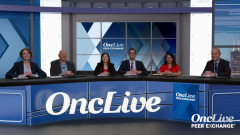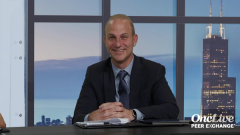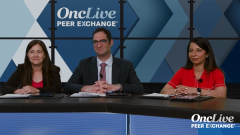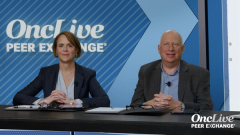
Is There a Role for IO Therapy in Advanced NSCLC With EGFR Mutations?
A brief review of suboptimal outcomes with immunotherapy in the setting of EGFR-mutant advanced non–small cell lung cancer.
Episodes in this series

Transcript:
Benjamin Levy, MD: Let’s talk about immunotherapy, specifically single-agent immunotherapy, for EGFR-mutated [lung cancer]. Despite the direct-to-consumer advertising on behalf of immunotherapy companies, these drugs don’t work for everyone, specifically those who have potentially driver mutations. Heather, do you want to briefly walk us through some of the data?
Heather Wakelee, MD: A lot of the data we have are anecdotal. Many of the trials of chemotherapy and immune therapy excluded patients with driver mutations that were known. Many of the driver mutations are in such a small percentage of patients that it’s really hard to have enough data. Stanford [Cancer Institute] was part of the immune targeted analysis where data was gathered from global sites where we had patients with driver mutations who had gotten immune therapy, trying to see if there were signals. From that and from several other similar types of analyses, we know that certain driver mutations like KRAS, beautiful. BRAF was a little bit mixed, we definitely do see some but not everyone, and I think that is because BRAF can happen in people with a smoking history or not. I think with MET it’s also a bit more nuanced. But there are some like ALK, ROS, and RET, where if you find those you know immune therapy is really not going to be working, and you can also have high PD-L1 and it still isn’t going to work.
But there’s more we need to know. I mentioned earlier with the adjuvant immune therapy, this EGFR signal is now seen in both of the trials. That doesn’t make sense, so I think there is more to learn, and especially if immune therapy works, it might be truly curative because you’re teaching the immune system about surveillance. If a TKI [tyrosine kinase inhibitor] works, it might be, but it’s harder to come up with that mechanistically.
Benjamin Levy, MD: All good points, and I think we’ve learned a lot recently about the lack of benefit of some of these drugs, and I think the community and the academics have piled on and said enough is enough. Yes these drugs work, and yes there’s a tail of the curve, and yes patients are being cured, but it’s probably not these patients with EGFR, ALK, or other driver mutations.
Transcript edited for clarity.










































